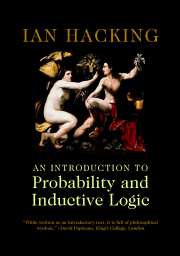todangst's blog

Why the "Problem of Induction" really isn't a problem. (And why theists don't even get it right)
Submitted by todangst on September 4, 2019 - 3:58pm.
Originally Submitted by todangst on April 23, 2007 - 8:00am.
Edits thanks to Bob Spence
What is Inductive Logic?

Gregory Lopez and Chris Smith
We can define any type of logic as a formal, a priori system (axiomatic) that is employed in reasoning. In general, if we feed in true propositions, and follow the rules of the particular system, the logic will crank out true conclusions.
We can define 'induction" as a thought process that involves moving from particular observations of real world phenomena to general rules about all similar types of phenomena (a posteriori). We hold that these rules that we generate are probably, but not certainly, true, because such claims are not tautologies.

The Internal Contradiction in Genesis that undoes all of Christianity
Submitted by todangst on January 18, 2019 - 1:40pm.Quite a claim I must admit.
1) "god" punishes adam and eve for the sin of disobeying by eating from the tree of knowledge of good and evil.

'Supernatural' (and 'immaterial') are broken concepts
Submitted by todangst on January 12, 2019 - 6:35pm.Originally Submitted by todangst on March 11, 2007 - 2:18am. I wish I could still keep these hours.
A note to theists: Please understand that the basis for my argument comes from negative theology. It was theologians who uncovered the problems with "god talk" nearly 2 eons before I could reach a keyboard.
The Apophatic tradition has been around for eons, and it's foundations can be found in the words of Paul and even in the OT. However, while negative theology avoids the incoherenfce of positive theology, once you special plead a 'god' beyond coherence, you must remain silent (Apophatic).
And now....
Terms like "supernatural" or "immaterial" are broken concepts: They are attempts at reference that cannot actually refer to anything. They are broken terms because they are defined solely in the negative (according to what they are not) without any universe of discourse (anything left over for them to be). As Deludedgod states (see link to his page at bottom) these terms are eliminative negative terms, which can only denote an empty set, meaning that any further talk using these terms is incoherent.
So we have words that tell us what something ISN'T, without anything left over for them to be.

How Does a Materialist Account for Logic?
Submitted by todangst on April 25, 2015 - 3:19pm.How Does A Materialist Account for Logic?
"How can you account for axioms in a materialistic universe? What part of your brain are axioms located in? Can you actually point to some neurons and say 'these are what the axioms really are'? Also, since the axioms of math are carried around in people's heads, are there really millions of little axioms of math running around? Finally, how come you also call an axiom written on the page the axiom' and the axiom in your head 'the axiom'? After all, paper isn't a bunch of neurons, and you are a materialist after all..."
Let's take this apart, piece by piece:
How do you account for the 'laws of logic' in a materialistic universe?

Pascal's Wager - Blaise Pascals Real Motive
Submitted by todangst on April 13, 2015 - 9:06pm.
Pascal's Gambit or Pascal's Wager, is a rather famous rhetorical ploy. It is not an argument for 'god', instead, it attempts to outline the pragmatic benefits of believing in a god. As such, it is intriguing because it is intended to gain believers without having to solve the impossible problem of offering proof of God's existence. Therefore, Pascal's wager is alluring in its simplicity. It's really an attack on doubt, for it states that the requirement of certainty in belief is a false one. Either 'God' exists or 'he' does not. If 'he' exists and you are a beliver, you "win". If 'he' does not exist and you believe, nothing is lost. However, If 'he' does exist and you are not a believer, you lose out on eternal life. Of the four possible permutations:
Belief and God exists = believer is saved
Non Belief and God exists = non believer suffers hellfire
Belief and God does not exist = believer does not suffer more than non believer
Non Belief and God does not exist = non believer does as well as believer

Would You Go On The Cross?
Submitted by todangst on April 13, 2015 - 9:00pm.Christians tell us that "jesus' died for us, and that he was a sacrifice.
I have two simple questions for our christian friends:
The first: What did this 'jesus' sacrifice? Is this jesus dead?
No. We are told: "He has risen."
Don't you hold that this jesus is now in eternal bliss, in heaven, where he receives the undying love and gratitude from a multitude?
Sacrifice means loss. Sacrificing doesn't involve gain. It certainly doesn't involve infinite gain. Yet this 'jesus' loses nothing, and gains everything.
Some theists respond by saying that he lost his physical body. But what does Paul say about the nature of flesh?
"For I know that in me that is in my flesh dwelleth no good thing...." (Rom 7:18)
and
"Now this I say, brethren, that flesh and blood cannot inherit the kingdom of God; neither doth corruption inherit incorruption" (1 Cor. 15:50)
So where's the sacrifice?
There is none. "Jesus" sheds something worthless. And we are told that he rises again - even this worthless shedding is only temporary.
Some theists then announce "But he suffered pain!"

Heresy - an irrational, self refuting concept
Submitted by todangst on April 13, 2015 - 8:43pm.I wrote some of this years many ago. I'm going to edit it a bit and post it here... with one addition: while heresy is a religious concept, atheists could fall prey to thinking in terms of heresy too.... so let's all be on the lookout for this type of thinking when it creeps up in our own thoughts.
HERESY
Definition:
"The act of asking one's pastor or priest a question he can't answer."
Ok, officially, "heresy" is an opinion or a doctrine at variance with established religious beliefs, especially dissension from or denial of dogma by a professed believer or baptized church member.
The concept of heresy ought to arouse any theist's critical thinking skills....in fact it should serve as an indicator of the falsity of a religion, as any system that was undeniably true would hardly need to fear and punish doubters. Undeniable truth would defend itself - denying it would lead to self contradiction.

Doesn't Everyone Take Things on Faith?
Submitted by todangst on April 7, 2015 - 10:18pm.You hear it from theists all the time: "Maybe I do take my beliefs on faith, but so do you!"
Leaving aside the theist's admission of what he really thinks of faith (not much, apparently!), is it true that everyone must take some beliefs on faith?
Well, here's the problem with that question: It contains a fallacy of equivocation.
A fallacy of equivocation occurs when an argument uses a word in two distinct senses. And the word "faith" has at least two very distinct meanings. One has a theological sense, and the other, a colloquial sense.
And we can best understand these two general meanings by using the terms Contingent and Non Contingent faith.

Trust is experiential - theistic faith is not.
Contingent faith - is trust. It originates as an instinctual connection to our mothers in infancy, and develops as the basic blueprint for how we interpret new situations. It is wholly experiential and open to revision.
So this sort of 'faith' is is based on some experience, an instinct, and then, a memory, an expectation. It is also open to falsification. If events occur that lead me to doubt the 'faith', I will discard my faith. If the stranger I have trusted harms me, then my willingness to trust the stranger (and perhaps other strangers) decreases.

Jesus, Paul Bunyan
Submitted by todangst on April 6, 2015 - 10:57pm.If I were to say that the claims for Jesus are just like claims for Paul Bunyan, you might become upset. You'd probably argue that serious claims for Paul Bunyan's existence are ridiculous, or that no one really believes in Paul Bunyan, and that the comparison is unfair for these reasons alone.

But notice that none of these complaints are actually rational arguments against Paul Bunyan. Arguing that a claim is false because it is ridiculous is a logical fallacy known as an "appeal to ridicule.' We all know examples of claims that appeared ridiculous but were actually true, it was once ridiculous to suppose that man could fly. Arguing that a belief is true or false based on its popularity is also a logical fallacy, known as 'ad populum'. Again, we can all think of popular claims that were shown to be false, such as the idea that the earth was the center of the solar system.
So when we rule out Paul Bunyan as a real person, how do we really come to this conclusion logically?

People in Hell According to the Tenets of christianity.
Submitted by todangst on April 6, 2015 - 10:41pm.People in Hell According to the Tenets of christianity.

Here is a list of people currently burning in hell according to the tenets of christianity.
(The original idea came from http://www.christslove.com/hell.htm. The site is now defunct)
JOHN 3:16
For God so loved the world that He gave His only begotten Son, that whoever believes in Him should not perish but have everlasting life."
Titus 3:5a
"Not by works of righteousness which we have done, but according to His mercy He saved us"
Book of John
"He that believeth on Him is not condemned: but he that believeth not is condemned already, because he hath not believed in the name of the only begotten Son of God."
Matthew:18:3
"And said, Verily I say unto you, Except ye be converted, and become as little children, ye shall not enter into the kingdom of heaven."

Anne Frank

